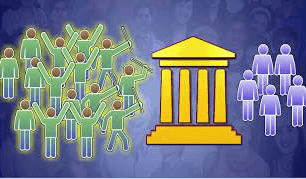Class 9 Civics Chapter 5 Notes - Democratic Rights
1. Three cases of denial of rights highlight the importance of rights.
2. The Human Rights were violated
(i) in Guantanamo Bay by the US,
(ii) in Kosovo by Milosevic’s Government, and
(iii) denial of rights in Saudi Arabia.
Rights in a Democracy
- Rights are a must to ensure the dignity, security and fair play to all the citizens.
- Democracy is a system in which maximum rights are guaranteed to its citizens.

What are Rights?
Rights are reasonable claims of persons recognised by society and sanctioned by law.
Why do We Need Rights in a Democracy?
- Rights sustain a democracy.
- They give to every citizen a right to vote and the right to be elected to government.
- They allow citizens to express their views freely, form parties and take part in political activities.
- Rights are guarantees when things go wrong. They do not allow the majority to dominate the minority.
- Some rights are placed higher than the government, so that the government does not violate them
Rights in the Indian Constitution
The Indian Constitution has given us six Fundamental Rights. They are the basic features of India’s Constitution.
Fundamental Rights are :
(i) Right to Equality
(ii) Right to Freedom
(iii) Right against Exploitation
(iv) Right to Freedom of Religion
(v) Cultural and Educational Rights
(vi) Rightto Constitutional Remedies.
Right to Equality : It grants equality to all its citizens in the eyes of law. No discrimination can be made against any citizen on grounds of birth, caste, religion and gender. Untouchability is made a cognisable offence. Equal opportunity is guaranteed to all the citizens.
Right to Freedom : It grants
(i) freedom of speech and expression,
(ii) freedom to assemble in a peaceful manner,
(iii) freedom to form associations,
(iv) freedom to move freely in any part of the country,
(v) freedom to reside in any part of the country and
(vi) practice any profession, carry out any occupation or trade.
Right against Exploitation : The constitution prohibits
(i) “traffic in human beings”,
(ii) Prohibits forced labour or begar and
(iii) prohibits child labour.
Right to Freedom of Religion : There is no state religion in India. All religions are given equal respect. Every person has a right to profess, practice and propagate his own religion. Cultural and Educational Rights : Minorities have the right to conserve their language and culture. They have the right to establish their own educational institutions.
Right to Constitutional Remedies : This is the right that makes all rights effective. If a citizen’s fundamental rights are violated or taken away, he/she can seek remedy through courts.
National Human Rights Commission is an independent organisation established in 1993. Its main work is to focus on human rights and help the victims, whose rights are violated.
Expanding Scope of Rights
The Constitution offers scope to expand the Fundamental Rights. Examples :
(i) School education has become a right for Indian citizens.
(ii) Right to property is a legal right.
(iii) Right to seek information from government offices.
(iv) Right to vote in elections.
International Covenant on Economic, Social and Cultural Rights
This international covenant recognises many rights. Examples
(i) Right to work
(ii) Right to safe and healthy environment
(iii) Right to adequate standard of living
(iv) Right to social security and insurance
(vi) Right to health and medical care, etc.
The South African Constitution Guarantees
Right to privacy, Adequate housing, Right to access to health care, Sufficient food and water.
|
17 videos|89 docs|30 tests
|
FAQs on Class 9 Civics Chapter 5 Notes - Democratic Rights
| 1. What are democratic rights? |  |
| 2. What is the significance of democratic rights? |  |
| 3. How do democratic rights protect citizens? |  |
| 4. What happens when democratic rights are violated? |  |
| 5. How can we ensure that democratic rights are protected? |  |



















